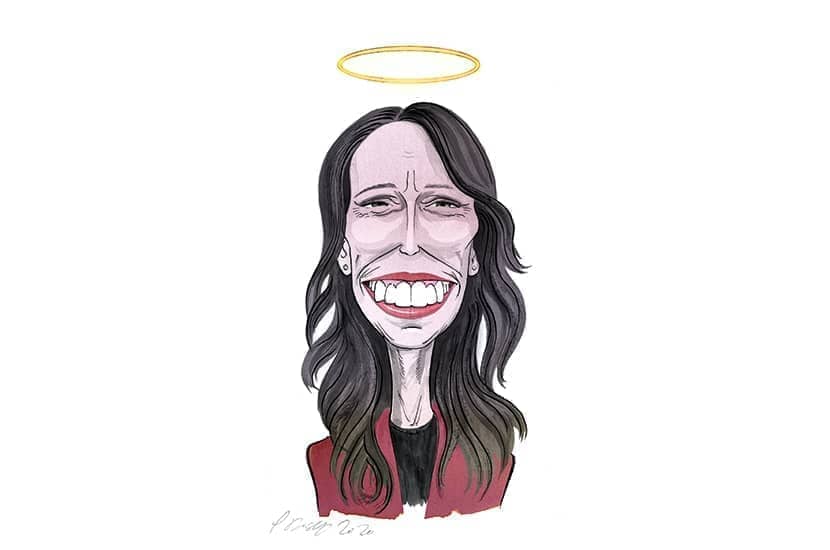Jacinda Ardern, once the golden girl of New Zealand politics, is in trouble. The country’s main opposition party, National, is edging ahead of the prime minister’s Labour government in the polls for the first time in two years, having opened up a two point lead. And while Adern is still the favoured pick to be PM her personal ratings have tumbled sharply: dipping down to 34 per cent from 58 per cent at the end of 2020. Is time up for Ardern?
When she won re-election in a landslide in October 2020, Ardern’s handling of the pandemic in the months before was generally credited as the reason why. Ardern’s ‘we go hard and we go early’ strategy was undoubtedly a success in the early days of the pandemic: New Zealand was one of the best countries in the world at fighting Covid-19. The response led to acclaim on the world stage and a massive surge in national solidarity and support for the government. Ardern was ascendant as the international darling of progressivism, featured on the covers of Time and Vogue.
But the Delta and Omicron variants subjected the country to the same restrictions and inertia as elsewhere. Recently, new case numbers for the Omicron variant reached 15,000 a day, however the death count remains low — and vaccination rates are close to 95 per cent of the eligible population.
But still, the health crisis has taken a political toll on the prime minister. Over the last four months the government has abandoned an alert level system and replaced it with a more intricate and sometimes confusing traffic light equivalent. It has also prevaricated on mandates, after a Canadian-inspired convoy made its way to the capital of Wellington.
Covid has been, and will likely remain, the dominant factor in Ardern’s political fortunes
The second lockdown of August 2021 wasn’t sustained by the kind of social and financial support that accompanied the initial imposition of restrictions in March 2020. That first effort led to hundreds of millions of dollars in direct support to social service providers, a six-month mortgage holiday scheme for homeowners, freezes on tax interest and rents and an evictions ban.
But in recent months, the government has been far less generous. Ardern’s star rating has suffered as a result. It’s true that most New Zealanders remain generally favourable toward the government’s overall pandemic response. But the cultural and economic malaise of the last two years has worn patience and sapped good will, and that has begun to be reflected in the polls.
Ardern’s victory in 2020 was so emphatic that, for the first time since the system of proportional system was set in place in 1996, a majority party was able to govern alone. When Kiwis go to the polls next year, that is unlikely to be repeated.
But is Ardern being blamed for events that are out of her hands? The issues of fuel and food and fuel prices, rental and home ownership costs, and the ongoing effects of the Omicron outbreak are beyond Ardern’s control. Vaccine mandates, crowd limits and border controls have disrupted people’s lives, yet the prime minister is compelled to continue balancing restrictive policies with the greater public good.
Like the previous government, after the global financial crisis and the Christchurch earthquakes, Ardern’s government has focused on trying to keep businesses operating and jobs going. However, the scale of borrowing to do so has been far more substantial, especially at a time of rising inflation and interest rates worldwide.
Covid has been, and will likely remain, the dominant factor in Ardern’s political fortunes. For much of 2019, her Labour government was registering only fair to middling results in the polls. By late 2019, it had slipped behind the opposition National party and it was feasible they would be a one-term government. A flagship initiative on housing had fallen well short of expectations, as had an initiative to combat child poverty. Urban infrastructure projects seemed to lack momentum and certainty. Separation from the opposition National party didn’t finally occur for Labour until Covid hit.
The government’s legislative agenda was constrained in the first term by a minor coalition partner, and has been tied up again in the second term by the persistence of the pandemic. With half the current parliamentary term almost over, the chances of its being able to produce significant progressive legislation before the next election are not high.
Yet despite the polling setback, it would be premature to suggest Ardern’s government is entering a political decline. Omicron numbers seem to be receding. The Government is shortly expected to loosen Covid-19 restrictions and has sped up the national re-opening to this spring, ahead of the former plan of July. Australians will be the first foreigners allowed in next month, and Americans can visit starting in May.
In another, less high-profile poll, from Taxpayers’ Union-Curia, Labour remains fractionally ahead of National, with just 0.9 points separating the parties, Labour on 36.2 per cent, National 35.3 per cent.
Finally, there is the broader view of New Zealand’s system of proportional representation. Even with her declining poll numbers, the left, including the Greens, as a political faction, would still win a majority on the most recent figures.
Ardern may yet have a successful third act, but a collective inclination, on the part of the New Zealand public, to move on from the dispiriting previous two years may weigh upon her by association, and lead to the electorate opting for a fresh start, with a fresh face. At the very least the lustre has worn off, and the days of ‘Jacinda mania’ are long gone.






Comments